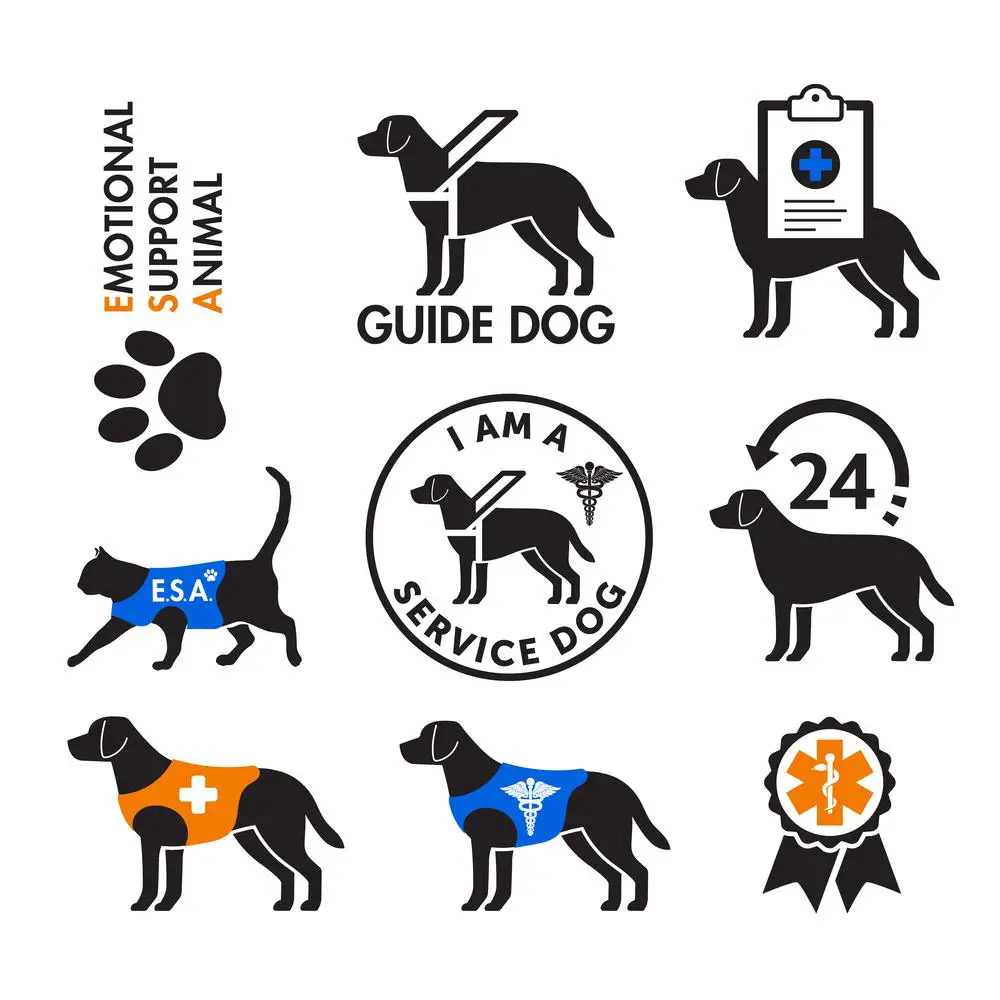As a BetterHelp affiliate, we receive compensation from BetterHelp if you purchase products or services through the links provided
In recent years, the Sunshine State has taken a firm stance on regulating emotional support animals, seeking to distinguish between legitimate needs and system exploitation. Florida’s lawmakers have recognized the vital role that emotional support animals play for individuals with disabilities, yet they’ve also become aware of how loose regulations have led to potential abuse. With the new law, Florida aims to strike a balance that protects the well-being of residents needing these animals while ensuring the rules are followed with integrity.
Understanding the role and requirements for emotional support animals in Florida is essential, whether you own an ESA or you’re involved in housing and property management. The law cracks down on fraudulent claims of emotional support animals by enforcing stricter guidelines and creating a framework for verification. This is vital to maintaining the trust necessary for ESAs to be recognized and respected. The law also underscores the need for clear communication between individuals with disabilities and housing providers to guarantee reasonable accommodations.
Key Takeaways
- Florida’s new ESA law addresses the need for proper verification to prevent abuse.
- It outlines more precise guidelines for both ESA owners and housing providers.
- The law also ensures individuals with legitimate needs receive reasonable accommodation.
Understanding Emotional Support Animals
 Emotional Support Animals (ESAs) play a vital role in the lives of individuals with mental disabilities, offering companionship and a calming presence. They are especially beneficial to those dealing with conditions like depression and anxiety.
Emotional Support Animals (ESAs) play a vital role in the lives of individuals with mental disabilities, offering companionship and a calming presence. They are especially beneficial to those dealing with conditions like depression and anxiety.
Differentiating Between ESAs and Service Animals
Emotional Support Animals:
- Definition: ESAs are pets that provide psychological comfort to individuals with mental health issues.
- Training: Unlike service animals, they are not required to undergo specialized training.
- Legal Recognition: They have different legal protections and are not granted the same public access as service animals.
Service Animals:
- Definition: Service animals are trained to perform specific tasks for people with disabilities.
- Training: They undergo extensive training to assist with physical, sensory, psychiatric, intellectual, or other mental disabilities.
- Legal Recognition: They are allowed in nearly all public spaces due to their role in assisting their handlers.
An emotional support animal may offer comfort, but a service animal provides essential aid recognized by the Americans with Disabilities Act (ADA).
The Role of ESAs in Mental Health
Impact on Mental Health:
- Companionship: ESAs can help mitigate feelings of loneliness, often experienced by individuals with depression or anxiety.
- Stress Reduction: An ESA can lower stress levels and promote a sense of calm.
Emotional support animals can significantly improve your daily life by providing emotional stability.
Key Takeaway: Remember, while ESAs provide valuable emotional support, they have a distinct role separate from service animals, and recognizing this helps ensure respect for the rights and needs of individuals relying on these animals for assistance.
Overview of New Florida Legislation
Recent updates to Florida law have introduced significant changes regarding Emotional Support Animals (ESAs). These changes affect both owners of ESAs and housing providers.
Key Components of the Law
The new legislation in Florida specifies that individuals who falsify information regarding an ESA could face consequences. Here are some key points:
- Proof of Need: You must provide documentation from a healthcare provider demonstrating the need for an ESA.
- Penalties for Misrepresentation: You could be charged with a misdemeanor if you falsify information or documentation for an ESA.
Implications for Emotional Support Animal Owners
For you as an ESA owner, understanding the full implications of this law is crucial:
- Rights and Responsibilities: You retain the right to live with your ESA without discrimination from housing providers.
- Housing Provider Requirements: Housing providers must make reasonable accommodations for ESAs but can now request documentation verifying the ESA’s legitimacy.
Key Takeaway: Staying informed about these changes ensures that you and your ESA can continue to enjoy your rights without running afoul of the new policies. For an in-depth perspective on the latest ESA regulations in Florida, you can look into the comprehensive coverage by the Florida Condo & HOA Law Blog.
Legal Requirements for ESAs

Navigating the guidelines for Emotional Support Animals (ESAs) ensures you comply with state laws and can fully benefit from the support your animal provides. In Florida, these clear-cut regulations emphasize the need for authentic documentation.
Documentation and Verification
To qualify for an ESA in Florida, you must obtain legitimate documentation. This typically comes as an ESA letter from a qualified healthcare professional. Your letter must include:
- The professional’s license number and type
- A statement that you have a disability as defined by law
- The need for your ESA as part of your treatment
Regarding accommodation, property owners can ask for this documentation to verify the need for an ESA. It’s crucial that you provide your ESA letter when requested to avoid any hiccups in your living situation.
Rights and Protections under the Fair Housing Act
Your Emotional Support Animal is protected under the Fair Housing Act (FHA). This means:
- Your ESA can live with you even in housing with “no pets” policies
- You’re not subject to pet fees or deposits for your ESA
However, bear in mind that these protections require you to have an ESA that doesn’t cause damage or disturbances. The FHA ensures you and your animal companion have the right to live together in peace.
Key Takeaway: Ensure your ESA documentation is current and genuine to maintain your rights under the Fair Housing Act and easily navigate Florida’s housing accommodations.
Responsibilities of Housing Providers

As a housing provider, your role is crucial in balancing the balance between accommodating emotional support animals (ESAs) and preventing fraud. Understanding your duties under Florida’s housing laws ensures you’re supporting tenants’ rights while maintaining the integrity of your housing community.
Accommodating Emotional Support Animals
What You Need to Know:
- You’re required to consider reasonable accommodation requests for ESAs.
- ESAs don’t need training like service animals, but they must alleviate specific symptoms of a disability.
How to Accommodate:
- Evaluate each request on a case-by-case basis.
- Ensure the ESA doesn’t pose a direct threat to the health or safety of others.
- Determine that the ESA won’t cause significant physical damage to property.
Key Takeaway: Always handle ESA accommodation requests thoughtfully to ensure you meet legal obligations while fostering a supportive community for all tenants.
Addressing Fraudulent ESA Claims
Understanding Fraud Risks:
- Fraud involves falsified information regarding an ESA or misrepresenting a disability.
Strategies for Prevention:
- Verify ESA documentation with a critical eye, looking for authenticity.
- Watch for red flags, like generic letters or instant certification from online sources.
Key Takeaway: Tackle ESA fraud proactively; keep your housing environment fair and lawful, ensuring support animals are there for valid reasons.
Rights of Individuals with Disabilities
Understanding your rights is crucial when navigating the landscape of emotional support animals. Recent changes to Florida law aim to strike a balance, granting certain rights to individuals with disabilities while also cracking down on abuse of the system.
Seeking Reasonable Accommodations
You can request reasonable accommodations for your emotional support animal in housing situations. This means if you have a disability, you can ask your landlord to make exceptions to their pet policy so you can live with your emotional support animal. It’s important to note that landlords may request proof of your need for an ESA, but they cannot charge you extra pet fees. Review the Florida Condo & HOA Law Blog for updates on documentation requirements.
- Submit your request in writing: Always provide your accommodation request formally to create a record.
- Include necessary documentation: A letter from a licensed healthcare provider will often be required.
Protection Against Discrimination
Federal law, namely the Fair Housing Act (FHA), protects you from discrimination based on your disability. Landlords or homeowners’ associations are not permitted to discriminate against you because you require an emotional support animal as part of your treatment plan. The new Florida laws bolster these protections, reiterating your right to have your emotional support animal without facing discrimination or unnecessary hurdles.
- Know your rights under the FHA: Your ESA is not considered a pet but a necessity for your emotional well-being.
- Be aware of your protections: You cannot be denied access to housing or charged additional fees for your ESA.
Key Takeaway: Remember, your right to reasonable accommodation for your emotional support animal comes with the responsibility to provide proper documentation and to abide by the laws meant to prevent fraudulent representations of ESAs.
Preventing Abuse of ESA Regulations
Florida is taking a stand against abusing Emotional Support Animal (ESA) regulations. The new measures address fraudulent information and emphasize community service, ensuring only legitimate requests for ESAs are approved and upholding the integrity of ESAs for individuals who genuinely need them.
Penalties for Misrepresentation
Misrepresenting a pet as an ESA for personal gain undermines the system and is now a punishable offense. If you’re caught providing fraudulent information to obtain ESA status for your pet, you could face:
- Fines, potentially hefty ones, to deter the abuse of regulations.
- Mandatory community service, which serves as a corrective measure.
Ensuring Legitimate ESA Requests
Let’s talk about avoiding those dicey areas with ESA requests. To safeguard the process and make sure your request is legitimate, you’ll need to:
- Consult a qualified mental health professional: They must provide a letter confirming the need for an ESA.
- Understand community policies: Get familiar with federal and local laws regarding ESAs.
Adopting these steps helps maintain a supportive environment for ESA owners and communities.
Role of Medical Professionals
In Florida, medical professionals play a pivotal role in designating an animal as an emotional support animal (ESA). They are responsible for issuing the required documentation after thoroughly assessing the individual’s need for therapeutic emotional support.
Issuing ESA Documentation
- Who Can Issue Documentation: Only a licensed health professional can issue the official ESA documentation. This typically includes psychologists, psychiatrists, or other medical doctors who have an established relationship with the individual seeking the ESA.
- Content of ESA Letter: The documentation should include the professional’s license number, the license type, the date the document was issued, and an assertion that the emotional support animal is a necessary component of the individual’s mental health treatment. It’s essential that your medical records support the need for an ESA.
Telehealth and In-Person Assessments
- In-Person Requirement: While telehealth services offer a convenient avenue for obtaining medical care, Florida law stipulates that an in-person assessment is necessary to issue ESA documentation. This step is crucial to ensure that the recommendation for an emotional support animal is legitimate and based on a genuine therapeutic relationship.
- Telehealth Provider’s Role: Despite the need for an in-person visit, telehealth providers can still play a part in your ongoing care. After your initial assessment, these professionals may continue to offer support and evaluate your need for an ESA through virtual appointments.
Key Takeaway: Ensure you engage with a licensed health professional who can adequately assess your need for an ESA and issue appropriate documentation while considering the importance of an in-person visit to fulfill Florida’s legal requirements.
Impact on Landlords and Property Owners
As a landlord or property owner in Florida, the new laws surrounding emotional support animals bring specific responsibilities to ensure compliance. They could change the way you approach no-pet policies in your accommodations.
Understanding New Compliance Requirements
Your role includes reviewing and understanding legislation’s new standards regarding emotional support animals. You’ll need to recognize legitimate requests for these animals in your properties. The key point is that the new clarifications help you differentiate between authentic needs and fraudulent claims.
- Documentation: Acceptable documents now exclude those bought online.
- Approval Process: A thorough but fair evaluation of each request is necessary, focusing on whether the emotional support animal is a reasonable accommodation.
- Policy Adaptation: Update your rental agreements to reflect these new legal standards.
Key takeaway: Ensure your paperwork and protocols are aligned with the new laws to avoid legal pitfalls.
Challenges in Implementing the New Law
Implementing the updated emotional support animal law may present hurdles, including adjusting your current no-pet policies and educating your staff about the changes.
- Policy Conflicts: Reconciling no-pet rules with the right to reasonable accommodation requires a delicate balance.
- Training Staff: Your team must be informed and trained on handling emotional support animal requests appropriately.
- Enforcement: Vigilance is necessary to enforce the new regulations while being mindful of tenants’ rights with genuine needs.
Key takeaway: Patience and diligence in applying the new rules will smoothen the transition for you and your tenants.
Regulation of Animal Registries
In Florida, the new law tightens the reins on emotional support animal certifications, explicitly targeting the authenticity and legitimacy of online registries.
The Truth About Online Registries
You might’ve encountered various online services claiming to register your pet as an emotional support animal (ESA) quickly and without hassle. However, the new Florida law distinguishes between legitimate registrations and those that might be less credible. It’s essential to understand that:
- No Immediate Certification: A certificate from an online registry alone won’t suffice.
- Health Professional’s Note: A legitimate ESA registration often requires a note from a healthcare provider confirming your need for an ESA.
Standards for Recognized Registries
Not all registries meet the mark. With the new Florida law, there’s a clear distinction between recognized and unrecognized registries. Here’s what you should know about compliant registries:
- Verification Process: A reliable registry will have a robust verification process for ESA certifications.
- Consistency with Law: The standards set by the state must be met, including adherence to federal regulations.
Key Takeaway: Always ensure your ESA registration is done through reputable sources that require appropriate documentation and healthcare provider involvement to support your needs.
Enforcement and Compliance
Navigating the waters of the new regulations on emotional support animals in Florida, you’ll find that enforcement and compliance are the twin anchors of maintaining order. Let’s guide you through how these rules are monitored and the role state regulators play.
Monitoring and Disciplinary Actions
The state has implemented measures to ensure that individuals and organizations adhere to the new laws. If you’re found to have falsified information regarding an emotional support animal, you could face misdemeanor charges. Here’s what else you need to know:
- Verification: Housing providers have a right to verify the need for an emotional support animal, preventing misrepresentation.
- Penalties: Engaging in deception about an emotional support animal can lead to disciplinary action, including fines and community service.
Key Takeaway: Be truthful about your need for an emotional support animal to avoid legal trouble.
Role of State Regulators
The role of state regulators is essential to successfully implementing these new laws. They keep a keen eye on compliance and step in when necessary:
- Licensing Boards: State licensing boards have the authority to take disciplinary actions against licensed individuals who violate the law.
- Education: Regulators spread awareness about the law’s specifics, ensuring everyone is on the same page.
Key Takeaway: The regulators are the shepherds, ensuring everyone plays by the rules, providing guidance and, when needed, discipline.
Frequently Asked Questions
You might have several questions when navigating the recent updates to Florida’s laws on emotional support animals. This section aims to clarify the guidelines, legal changes, consequences, and property rights involved with these new regulations—providing you with the essential information you need.
What are the guidelines for qualifying animals as emotional support animals under the new Florida laws?
Under the updated laws, qualifying an animal as an emotional support animal in Florida requires documentation from a licensed healthcare provider. Such documentation must confirm that you have a disability and that the animal in question is necessary for your emotional or mental health. You might want to read about New Laws Regarding Emotional Support Animals for in-depth guidelines.
How have Florida’s emotional support animal laws evolved in recent years?
The evolution of Florida’s laws on emotional support animals has been aimed at preventing fraudulent representation of these animals. Recent changes focus on ensuring that individuals with legitimate needs are granted the necessary accommodations while imposing stricter regulations to deter fraudulent activities.
What are the potential consequences for denying access to service animals after the recent changes in Florida law?
The person responsible could face legal repercussions if a service animal is wrongly denied access. This is because service animals, distinctly different from emotional support animals, are protected under the Americans with Disabilities Act. Florida laws, including recent amendments, support these federal regulations and uphold the rights of individuals with service animals to public access.
Can Florida residents have multiple emotional support animals, and have the rules changed for this?
Florida residents can have multiple emotional support animals if necessary for their well-being, and each animal has proper documentation. The new laws have not significantly altered the rules regarding the number of emotional support animals a person can have. Still, they do emphasize the requirement for legitimate documentation for each animal.
What are the specifics of Florida’s law SB1084 regarding emotional support animals?
Florida’s law SB1084 implements stringent measures to prevent misrepresenting emotional support animals. It outlines healthcare provider documentation requirements, stipulates penalties for fraudulent representation, and clarifies distinctions between service animals and emotional support animals. Delving into Florida’s law SB1084 will give you a comprehensive view.
Under the updated legislation, what are the rights of landlords when it comes to emotional support animals in Florida?
Landlords in Florida must provide reasonable accommodations for emotional support animals, even if a building has a no-pet policy. However, they now have the right to request reliable documentation that an emotional support animal is necessary. Landlords are also permitted to deny accommodations if the animal threatens the safety or property of others. You might find the Florida Emotional Support Animal Law Guide helpful for more details.
Key takeaway: Staying informed on the latest regulations will help ensure that your rights and responsibilities concerning emotional support animals in Florida are clear, keeping you compliant with state laws.
- 7 Ideas to Help You Relax and Unwind on a Family Vacation - April 27, 2025
- How Having Cybersecurity Protection Helps You Relax - April 25, 2025
- 8 Reasons Why Spending Time Outside Calms You Down - April 25, 2025
This site contains affiliate links to products. We will receive a commission for purchases made through these links.



